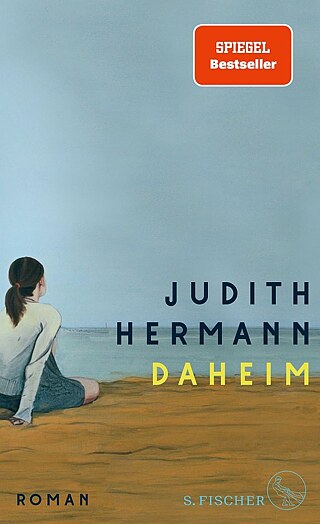Judith Hermann
The old box trick
In her new novel, Judith Hermann tells the story of a women seeking to start a new life in an isolated seaside village. Having arrived, she is not only caught up by her past, but is also confronted by very different fates.
By Holger Moos

The main story is set 30 years later. The narrator, now 47, has meanwhile met and married Otis and has a daughter, Ann. When Ann drops out of school aged 18 and abruptly sets out on an adventurous world trip, only occasionally sharing the coordinates of her respective location with her parents, her mother leaves Otis. She seeks solitude, and herself, on the edge of a coastal village in northern Germany – far from the turmoil of political and social life.
THE APPEAL OF TORCH AND SLEDGEHAMMER
Living alone in a house by the sea, she suddenly feels exposed to previously unknown fears. The door to her house opens suddenly during the night. It must have been the wind. An animal lives between the walls, obtrusively loud and invisible. Presuming it to be a marten, she sets a trap. Associations with the magician’s box are aroused.The narrator meets other inwardly homeless people. Her older brother Sascha, in whose beach pub she works, has just fallen for a woman nearly forty years his junior called Nike and allows her to humiliate him. Nike has a traumatic past in which a box became a trap. The trap is a recurring leitmotif, you notice. In Nike’s case, its effect is not only mental, but also physical. “She’s the spitting image of the figure in Munch’s picture of the scream”, it says at one point.
Then there’s the narrator’s neighbour Mimi, with whom she makes friends. Mimi is an artist and a multiple divorcee. She loves swimming in the nude in the brackish water of the harbour, and mows the lawn, also in the nude. Mimi’s brother Arild has taken over their parents’ pig farm. The narrator immediately feels drawn to this down-to-earth, taciturn animalistic man: “He had a torch with him and a sledgehammer. I found him irresistible.“
ARCHAIC PROVINCES
There is something archaic about the north German provinces. There is not much talking. Nor is it very easy to find a home there. “Going home, my brother says, drawing out the words. Going home. What a sound. (...) Do you feel at home here or what. Out there I mean. In that house by the polder.“Magic box or Pandora’s box - it’s hard to say which is closer to each life situation. Everyone’s sitting in boxes or traps and release is not always possible. The novel can be read realistically and allegorically. The narrator is unreliable, nothing is certain. “It’s possible”, she writes at one point, “that I’m dreaming and dreamt everything. I dreamt Ann and Otis, I’m dreaming the water, my childhood, myself.“
Nor does Daheim have a comfortable ending. Disaster strikes after Mimi’s and Arild’s mother turns eighty. In spite of everything, this novel - which was quite rightly nominated for this year’s Leipzig Book Fair Prize - draws an almost comforting conclusion for people in their confinement: “The trap is in the corner, both its flaps closed. Nothing is moving inside, absolutely nothing. All is still.“ What would happen if one were to open it?

Frankfurt: S. Fischer, 2021. 192 p.
ISBN: 978-3-10-397035-7